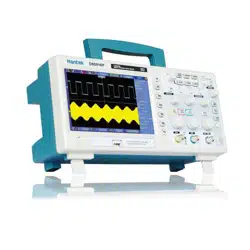Loading ...
Loading ...
Loading ...

Basic Operation
DSO5000P Series Digital Storage Oscilloscope User Manual 36
Memory Depth
(Real Time)
4K, 20K, 40K
Select the memory depth for different board models.
Normal: For the oscilloscope model with the bandwidth of 100MHz, the maximum sample rate is
1GS/s. For time base with insufficient sample rate, you may use the Sine Interpolation Algorithm to
interpolate points between sampled points to produce a complete waveform record (4K by
default).
Peak Detect: Use this mode to detect glitches within 10ns and to limit the possibility of aliasing.
This mode is valid at the SEC/DIV setting of 4µs/div or slower. Once you set the SEC/DIV setting
to 4µs/div or faster, the acquisition mode will change to Normal because the sample rate is fast
enough that Peak Detect is unnecessary. The oscilloscope does not display a message to tell you
that the mode has been changed to Normal.
Average: Use this mode to reduce random or uncorrelated noise in the signal to be displayed.
Acquire data in Normal mode and then average a great number of waveforms. Choose the
number of acquisitions (4, 16, 64 or 128) to average for the waveform.
Stopping the Acquisition: When you are running the acquisition, the waveform display is live.
Stop the acquisition (press the RUN/STOP button) to freeze the display. In either mode, the
waveform display can be scaled or positioned by vertical and horizontal controls.
Equivalent Acquisition: Just repeat the Normal acquisition. Use this mode to take a specific
observation on repeatedly displayed periodic signals. You can get a resolution of 40ps, i.e.
25GSa/s sample rate, which is much higher than that obtained in real-time acquisition.
The acquisition principle is as follows.
Sample Points
Normal Acquisition Intervals
8
3
7
2
4
5
6
1
9
10
Normal Mode Acquires a Single Sample Point in Each Interval
Input repeated signals
First Acquisition
Second Acquisition
Third Acquisition
Fourth Acquisition
Loading ...
Loading ...
Loading ...
